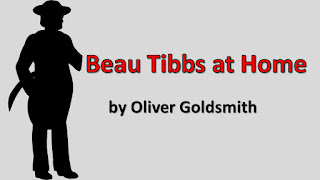by Oliver Goldsmith
(Summary)
Oliver
Goldsmith was an essayist of ‘The age of Transition’. The general
characteristics of the age are: -
• Decline of party feud
• The French revolution
• Renaissance of learning
• The new realism
• The rise of middle class
• The humanitarian spirit and
• The age of transition.
Goldsmith
was born in 1728. He wrote both poetry and essays. He contributed to the
periodical essays. His essays have extraordinary power, boldness, originality
of thoughts, humor and tenderness. His
style is clear and delicate and made him a great essayist.
In
the essay, ‘Beau Tibbs at home’, goldsmith wants to stress on the thought “the company
of fools may at first make us smile but at last never fails of rendering us
melancholy”. He also throws light on the contemporary English society. Beau
Tibbs represents the contemporary English, middle class.
The
narrator of this story meets Mr. Tibbs, in one of the public walks. Tibbs meets
him with an air of perfect familiarity, though they met, a day before only.
Tibbs is in his usual dress. The author considers him, a harmless, amusing,
little thing and so they walk forward.
While
walking together the narrator observes, that the absurdities of Tibbs’
character soon began to appear. He bows to several well-dressed persons, draws
out a pocket book and seems to take notes in that. Those who see him, doing
such absurdities, laugh at him. When they come out of the procession, he gives
a remark – “when the world laughs at me, I laugh at all the world and so we are
even”. Tibbs sometimes makes a party for being ridiculous.
Mr.
Tibbs invites the narrator to his house. Tibbs wants to introduce his wife and
daughter, to the narrator. He informs the narrator, that his daughter knows the
famous country dance and can play the guitar well. He says that he is designing
her, for his friend’s son. Mr. Tibbs also informs him, about his wife, that she
has a beautiful body of voice. During his talk, he repeatedly asks the narrator
to keep all these information, secret. He takes the narrator to his house, not
through the straight road, but through many dark and winding ways.
When
the narrator and Tibbs reach to his house, the narrator finds that his house is
a dismal looking house and he calls it the first floor down to chimney. An old
maid servant opens the door. He gives an extravagant remark for her also and
says that he had her from a parliament man. The old woman innocently reveals
the secret of their house by saying, that his wife has gone to the neighbors to
wash his two shirts because they have taken an oath against lending out their
tub any more.
When
Mrs. Tibbs arrives, she also shows vanity by saying that she had been out all
the night in the garden with the countess. After that, the Tibbs couple has
wasted the narrator’s time in useless conversation about the menu of the
dinner. This vexes the narrator and he pretends to have recollected a prior
engagement and leaves the house.
Oliver
Goldsmith can be said the representative writer of his age. His writings carry
almost all the characteristics of the period to which he belonged. The essay
‘Beau Tibbs at home’ shows the vanity of the middle class of that age through
the characters, Beau Tibbs and his wife, Mrs. Tibbs.










0 Comments